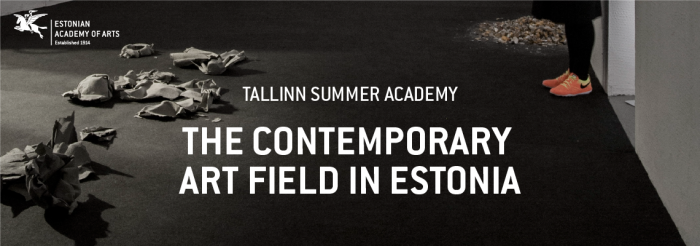Estonia pst 7, Tallinn
Algus k.p.:
06.08.2018
Algusaeg:
10:00
Lõpp k.p.:
08.08.2018

Dates: 6-8 August 2018
Location: ARS Art Factory, Pärnu mnt 154, Tallinn, room no 111
Volume: 24 academic hours, 1 ECTS
Number of participants: max 22
Cost: FREE (Please note that this course is meant for higher education students only.)
Registration deadline: 6th of May
In addition to the general required materials, candidates are expected to submit a letter of motivation explaining why they are applying (max A4).
The Contemporary Art Field in Estonia short course is meant for international art history or curatorship students who are who are studying contemporary Estonian or Baltic art, are interested in the contemporary Estonian art world and in working with Estonian artists, curators or art historians, plan to enrol at the Estonian Academy of Arts and are looking for an overview of how the local art landscape operates. The workshop will be led by Academy of Arts teaching staff member, head of the Centre for General Theory Subjects and freelance art critic Maarin Ektermann.
The short course provides an overview of how contemporary art scene in Estonia functions – the most important organizations, the movers and shakers, the currently important and active artists from different disciplines, and the types of events being held. The causal factors behind the art scene are also explored, starting from the restoration of independence, Estonian art in the context of the regional and broader international art scene, and much more.
Topics to be discussed:
- Trends in contemporary art (social criticism, new painting, installation – architectural approach – public space, photography, graphic design, applied arts, etc.). Examples of artists and their work.
- The functioning of the art scene – who is active (what types of professions are feasible in Estonia), how are they funded (Ministry of Culture, Cultural Endowment of Estonia, creative industries, the law that requires a 1% art budget for public buildings, private capital, the art market, artists and work), general diagnostics – bottlenecks and success stories. The development of the art scene since the 1990s, illustrated by keywords.
- Central institutions and platforms (public and private capital-based). What is characteristic for, e.g. galleries, town galleries in county seats, creative industries centres, etc.? Other examples: artists’ residencies, culture factories, Tallinn Art Hall, Tartu Art Museum, Temnikova and Kasela Gallery, Centre of Contemporary Art Estonia, Estonian Artists’ Association.
- Formats and locations of various events. Concentration of art scene mainly in Tallinn and Tartu – what’s going on elsewhere?
More info and link to registration: https://www.artun.ee/summeracademy/the-contemporary-art-field-in-estonia/
